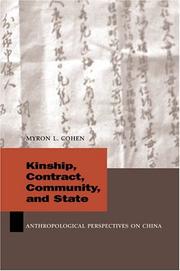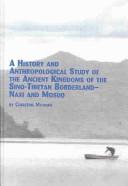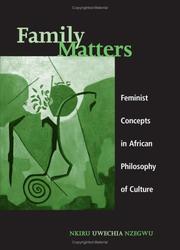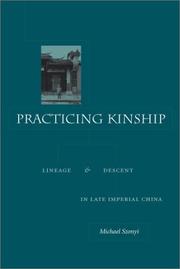| Listing 1 - 7 of 7 |
Sort by
|
Book
ISBN: 1843843587 9781843843580 9781782041658 1782041656 Year: 2013 Publisher: Woodbridge : Boydell & Brewer,
Abstract | Keywords | Export | Availability | Bookmark
 Loading...
Loading...Choose an application
- Reference Manager
- EndNote
- RefWorks (Direct export to RefWorks)
Late medieval English society placed great weight on the practices of primogeniture, patrilineal descent, and patriarchal government, and the significance of the father had cultural resonance beyond the rule of law. Yet despite a burgeoning interest in both the family and gender, "the father" has to date received little attention from medievalists. This book takes an interdisciplinary approach to the analysis of the "fictions" of fatherhood, the ideological constructs that underpinned late medieval conceptions of fathers and patriarchy. Its focus on gentry and mercantile readers and writers also offers new insights into the literary culture of late medieval England by considering how texts were produced and received within gentry and bourgeois communities, and demonstrates the ability of texts to not only reflect but also shape hegemonic norms and cultural anxieties. Through close examination of late medieval letters and romances, It shows how the father was the dominant figure not only of medieval domestic life, but also of the medieval imagination. Dr Rachel Moss is Lecturer in Medieval History, Faculty of History, University of Oxford.
English literature --- Fatherhood in literature. --- Fatherhood --- History and criticism. --- History --- Parenthood --- Gentry. --- Ideological Constructs. --- Late-Medieval Father. --- Mercantile Readers. --- Middle English Texts. --- Patriarchy. --- Patrilineal Descent. --- Primogeniture. --- Literature and society
Book
ISBN: 1283615762 9786613928214 0761847790 9780761847793 9781283615761 0761847782 9780761847786 Year: 2009 Publisher: Lanham, Md. University Press of America
Abstract | Keywords | Export | Availability | Bookmark
 Loading...
Loading...Choose an application
- Reference Manager
- EndNote
- RefWorks (Direct export to RefWorks)
This book is a study examining the causes of the kingship internecine struggle among the Effutu by exploring the two traditional systems of succession, the patrilineal and the matrilineal among the Effutu (Awutu-abe), and how best to end political violence.
Efutu (African people) --- Matrilineal kinship --- Patrilineal kinship --- Tribal government --- Political science --- Tribes --- Agnatic descent --- Agnatic kinship --- Patrilineal descent --- Patriliny --- Unilineal descent (Kinship) --- Patriarchy --- Matrilineal descent --- Matriliny --- Matriarchy --- Afutu (African people) --- Awutu (African people) --- Effutu (African people) --- Fetu (African people) --- Futu (African people) --- Ethnology --- Kings and rulers --- Succession. --- Kinship. --- Winneba (Ghana) --- Winneba, Ghana --- Simpa (Ghana)

ISBN: 080475067X Year: 2005 Publisher: Stanford (Calif.) University Press
Abstract | Keywords | Export | Availability | Bookmark
 Loading...
Loading...Choose an application
- Reference Manager
- EndNote
- RefWorks (Direct export to RefWorks)
S11/0700 --- S11/0705 --- S11/1200 --- S02/0200 --- China: Social sciences--Clan and family: general and before 1949 (incl. names, clan rules) --- China: Social sciences--Clan and family: since 1949 --- China: Social sciences--Anthropology, ethnology (incl. human palaeontology): general and China --- China: General works--Civilization and culture --- Ethnology --- Families --- Kinship --- Patrilineal kinship --- Agnatic descent --- Agnatic kinship --- Patrilineal descent --- Patriliny --- Unilineal descent (Kinship) --- Patriarchy --- China --- History. --- Social life and customs.
Book
ISBN: 029580565X 9780295805658 9780295994215 0295994215 Year: 2014 Publisher: Seattle
Abstract | Keywords | Export | Availability | Bookmark
 Loading...
Loading...Choose an application
- Reference Manager
- EndNote
- RefWorks (Direct export to RefWorks)
"Calling in the Soul (Hu Plig) is the chant the Hmong use to guide the soul of a newborn baby into its body on the third day after birth. Based on extensive original research conducted in the late 1980's in a village in northern Thailand, this ethnographic study examines Hmong cosmological beliefs about the cycle of life as expressed in practices surrounding birth, marriage, and death, and the gender relationships evident in these practices. The social framework of the Hmong (or Miao, as they are called in China, and Meo, in Thailand), who have lived on the fringes of powerful Southeast Asian states for centuries, is distinctly patrilineal, granting little direct power to women. Yet within the limits of this structure, Hmong women wield considerable influence in the spiritually critical realms of birth and death"--
Hmong Americans --- Patrilineal kinship --- Sexual division of labor --- Sex role --- Women, Hmong --- Hmong (Asian people) --- Agnatic descent --- Agnatic kinship --- Patrilineal descent --- Patriliny --- Unilineal descent (Kinship) --- Patriarchy --- Division of labor by sex --- Division of labor --- Sex discrimination in employment --- Gender role --- Sex (Psychology) --- Sex differences (Psychology) --- Social role --- Gender expression --- Sexism --- Hmong women --- Women, Hmong (Asian people) --- Hmoob (Asian people) --- Hmu (Asian people) --- Hmung (Asian people) --- Humung (Asian people) --- Meo (Southeast Asian people) --- Miao people --- Moob (Asian people) --- Ethnology --- Social life and customs. --- Social conditions. --- Rites and ceremonies. --- Thailand, Northern --- Gender roles --- Gendered role --- Gendered roles --- Role, Gender --- Role, Gendered --- Role, Sex --- Roles, Gender --- Roles, Gendered --- Roles, Sex --- Sex roles

ISBN: 0773466452 Year: 2003 Volume: 11 Publisher: Lewiston, N.Y. : Edwin Mellen Press,
Abstract | Keywords | Export | Availability | Bookmark
 Loading...
Loading...Choose an application
- Reference Manager
- EndNote
- RefWorks (Direct export to RefWorks)
Naxi (Chinese people) --- Matrilineal kinship --- Patrilineal kinship --- Moso (Peuple de Chine) --- Ethnic identity. --- Religion. --- Kinship. --- Identité ethnique --- Parenté --- Lijiang Zhuanqu (China) --- History. --- Social life and customs. --- S11/1223 --- -Naxi (Chinese people) --- -Matrilineal kinship --- -Patrilineal kinship --- -Agnatic descent --- Agnatic kinship --- Patrilineal descent --- Patriliny --- Unilineal descent (Kinship) --- Patriarchy --- Matrilineal descent --- Matriliny --- Matriarchy --- Moso (Chinese people) --- Moso (Tribe) --- Mosso (Chinese people) --- Na-hsi (Chinese people) --- Na-khi (Chinese people) --- Nahsi (Chinese people) --- Nakhi (Chinese people) --- Ethnology --- Tibeto-Burman peoples --- Yi (Chinese people) --- China: Social sciences--Noso, Naxi --- Ethic identity --- Religion --- Kinship --- Lijiang Diqu (China) --- -Lijiang Diqu (China) --- -History --- Social life and customs --- -China: Social sciences--Noso, Naxi --- Identité ethnique --- Parenté --- Agnatic descent --- Ethnic identity --- Li-chiang ti chʻü (China) --- Li-chiang ti chʻü, China --- Lijiang Shi (China)

ISBN: 0791481824 142941183X 9781429411837 0791467430 9780791467435 0791467449 9780791467442 9780791481820 Year: 2006 Publisher: Albany State University of New York Press
Abstract | Keywords | Export | Availability | Bookmark
 Loading...
Loading...Choose an application
- Reference Manager
- EndNote
- RefWorks (Direct export to RefWorks)
Prior to European colonialism, Igboland, a region in Nigeria, was a nonpatriarchal, nongendered society governed by separate but interdependent political systems for men and women. In the last one hundred fifty years, the Igbo family has undergone vast structural changes in response to a barrage of cultural forces. Critically rereading social practices and oral and written histories of Igbo women and the society, Nkiru Uwechia Nzegwu demonstrates how colonial laws, edicts, and judicial institutions facilitated the creation of gender inequality in Igbo society. Nzegwu exposes the unlikely convergence of Western feminist and African male judges' assumptions about "traditional" African values where women are subordinate and oppressed. Instead she offers a conception of equality based on historical Igbo family structures and practices that challenges the epistemological and ontological bases of Western feminist inquiry.
Feminist theory --- Patrilineal kinship --- Families --- Sex role --- Philosophy, Igbo. --- Women, Igbo --- Igbo (African people) --- Feminism --- Feminist philosophy --- Feminist sociology --- Theory of feminism --- Agnatic descent --- Agnatic kinship --- Patrilineal descent --- Patriliny --- Unilineal descent (Kinship) --- Patriarchy --- Family --- Family life --- Family relationships --- Family structure --- Relationships, Family --- Structure, Family --- Social institutions --- Birth order --- Domestic relations --- Home --- Households --- Kinship --- Marriage --- Matriarchy --- Parenthood --- Gender role --- Sex (Psychology) --- Sex differences (Psychology) --- Social role --- Gender expression --- Sexism --- Igbo philosophy --- Philosophy, Igbo (African people) --- Igbo women --- Women, Igbo (African people) --- Ibo (African people) --- Ibo tribe --- Ethnology --- Social conditions. --- Kinship. --- Philosophy --- Social aspects --- Social conditions --- Sociology of culture --- Sociology of the family. Sociology of sexuality --- Social policy --- Family law. Inheritance law --- Nigeria --- Africa --- Gender roles --- Gendered role --- Gendered roles --- Role, Gender --- Role, Gendered --- Role, Sex --- Roles, Gender --- Roles, Gendered --- Roles, Sex --- Sex roles --- Race --- Equal opportunities --- Book --- Culture --- Inheritance law

ISBN: 0804742618 Year: 2002 Publisher: Stanford (Calif.): Stanford university press
Abstract | Keywords | Export | Availability | Bookmark
 Loading...
Loading...Choose an application
- Reference Manager
- EndNote
- RefWorks (Direct export to RefWorks)
Presenting a new approach to the history of Chinese kinship, this book attempts to bridge the gap between anthropological and historical scholarship on the Chinese lineage by considering its development in terms of individual and collective strategies. Based on a wide range of newly available sources such as lineage genealogies and stone inscriptions, as well as oral history and extensive observation of contemporary ritual practice in the field, this work explores the historical development of kinship in villages of the Fuzhou region of southeastern Fujian province. In the late imperial period (1368-1911), the people of Fuzhou compiled lengthy genealogies, constructed splendid ancestral halls, and performed elaborate collective rituals of ancestral sacrifice, testimony to the importance they attached to organized patrilineal kinship. In their writings on the lineage, members of late imperial elites presented such local behavior as the straightforward expression of universal and eternal principles. In this book, the author shows that kinship in the Fuzhou region was a form of strategic practice that was always flexible and negotiable. In using the concepts and institutions of kinship, individuals and groups redefined them to serve their own purposes, which included dealing with ethnic differentiation, competing for power and status, and formulating effective responses to state policies. Official efforts to promote a neo-Confucian agenda, to register land and population, and to control popular religion drove people to organize themselves on kinship principles and to institutionalize their kinship relationships. Local efforts to turn compliance with official policies, or at least claims of compliance, to local advantage meant that policymakers were continually frustrated. Because kinship was constituted in a complex of representations, it was never stable or fixed, but fluid and multiple. In offering this new perspective on this history of Chinese lineage practices
S11/0700 --- S04/0451 --- Kinship --- -Patrilineal kinship --- -Agnatic descent --- Agnatic kinship --- Patrilineal descent --- Patriliny --- Unilineal descent (Kinship) --- Patriarchy --- Ethnology --- Clans --- Consanguinity --- Families --- Kin recognition --- China: Social sciences--Clan and family: general and before 1949 (incl. names, clan rules) --- China: History--Gazetteers: Fujian --- History --- China --- Genealogy. --- -History --- -Kinship --- Patrilineal kinship --- History. --- -China: Social sciences--Clan and family: general and before 1949 (incl. names, clan rules) --- -S11/0700 --- Cina --- Kinë --- Cathay --- Chinese National Government --- Chung-kuo kuo min cheng fu --- Republic of China (1912-1949) --- Kuo min cheng fu (China : 1912-1949) --- Chung-hua min kuo (1912-1949) --- Kina (China) --- National Government (1912-1949) --- China (Republic : 1912-1949) --- People's Republic of China --- Chinese People's Republic --- Chung-hua jen min kung ho kuo --- Central People's Government of Communist China --- Chung yang jen min cheng fu --- Chung-hua chung yang jen min kung ho kuo --- Central Government of the People's Republic of China --- Zhonghua Renmin Gongheguo --- Zhong hua ren min gong he guo --- Kitaĭskai︠a︡ Narodnai︠a︡ Respublika --- Činská lidová republika --- RRT --- Republik Rakjat Tiongkok --- KNR --- Kytaĭsʹka Narodna Respublika --- Jumhūriyat al-Ṣīn al-Shaʻbīyah --- RRC --- Kitaĭ --- Kínai Népköztársaság --- Chūka Jinmin Kyōwakoku --- Erets Sin --- Sin --- Sāthāranarat Prachāchon Čhīn --- P.R. China --- PR China --- Chung-kuo --- Zhongguo --- Zhonghuaminguo (1912-1949) --- Zhong guo --- Chine --- République Populaire de Chine --- República Popular China --- Catay --- VR China --- VRChina --- 中國 --- 中国 --- 中华人民共和国 --- Jhongguó --- Bu̇gu̇de Nayiramdaxu Dundadu Arad Ulus --- Bu̇gu̇de Nayiramdaqu Dumdadu Arad Ulus --- Bu̇gd Naĭramdakh Dundad Ard Uls --- Khi︠a︡tad --- Kitad --- Dumdadu Ulus --- Dumdad Uls --- Думдад Улс --- Kitajska --- Agnatic descent
| Listing 1 - 7 of 7 |
Sort by
|

 Search
Search Feedback
Feedback About UniCat
About UniCat  Help
Help News
News